
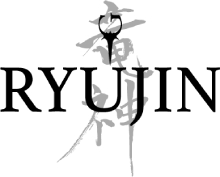
| Interview: | RYUJIN |
| Title: | Warlike spirit |
Fast-as-an-arrow, bombastically arranged, thunderous MeloDeath with typically folky, traditional Nippon nuances is the rousing power-pleasure of these Japanese storm souls, who celebrate all kinds of furious dragon rides on the Far Eastern musical scale on their current, self-titled album.
As is so often the case with idiosyncratic artists from this part of the world, hungry mutability dominates their entire career - having started out as Suicide Heaven, the musicians then founded Gyze in 2011, which now leads to Ryujin's first long-player after yet another name change.
Superbly produced by Trivium's singer and axeman Matthew Kiichi Heafy, who, as a half-Japanese, fraternized with Ryujin quite fruitfully, the samurai Metal sound was given just the right treatment - revealing one of the most vibrant and dynamic Metal albums ever to the global scene.
The experienced formation itself, which has already performed at major festivals worldwide with four successful albums, calls its hyper-energetic sound spectacle „Samurai Metal“ - and as singer, guitarist and keyboardist Ryoji ‚Ryo’ Shinomoto, who has been a formative part of the band from the very beginning, reports, he and his comrades-in-arms do not suffer from any problems with self-identification.
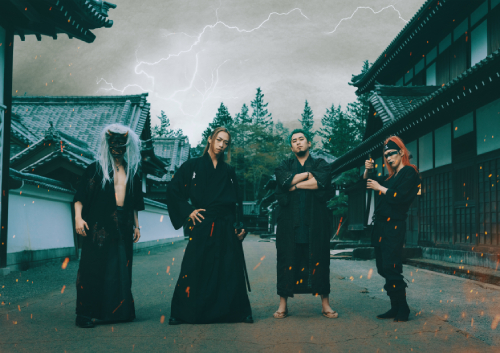 „Samurai Metal“ - that's new, isn't? We Europeans know nearly nothing about these historic warriors and their world - what fascinates you most on them?
„Samurai Metal“ - that's new, isn't? We Europeans know nearly nothing about these historic warriors and their world - what fascinates you most on them?
„It's like the so-called Scandinavian Viking Metal. I'm using it because the song title of the single I originally released with Gyze in 2021 was ‚Samurai Metal‘ and it can easily be understood as a description for Japanese Metal. The song is not all about the history of the Samurai, but I frequently write about that era, and I also showcase Japanese scales and instruments in the music to create originality. For us Japanese, the age of the samurai is so long ago that it feels like a fantasy, but it is still a term used today when the Japanese are on the world stage. For example, in the case of baseball, it is Samurai Japan! There are many theories about the history of the samurai, but during the Warring States period, which lasted from the mid-15th century until 1603, when the Edo shogunate was established, it was possible to become a samurai by working on the battlefield, regardless of one's background. In the Edo period (1603-1867), a status system called ‚shi (warrior), farmer, craftsman, and merchant‘ was established. Within this status system, the samurai (samurais) were placed in the highest position and were the ruling class of Japan. I don't have any admiration for the Samurai, but when I play Metal music in various countries, I am sure that the Samurai spirit in my heart is manifested!“
Congrats for your self-titled debut album - one of the most lively and all-kinds-of-dynamic albums out of the last decade! How do you see and rate it yourselves?
„Thank you very much! I think this piece has a lot of variation. This is thanks to Matthew. He opened many new doors and we found new possibilities with his production. From the song selection to the singing style, this time it was the result of trusting him. We also asked Mark, an American engineer, to do the sound for the first time, so it's different from the European sound we've had in the past. I am sure that a lot of people will like this album.“
Also the cover art shows a lot of fine taste - what is behind it thematically?
„It was clear from the beginning that we will use oriental dragons for this. I think it's very mysterious, I love it. Also! In the East, dragons are considered as very auspicious and theres a little difference to the western kind of dragons as they look more like snakes than lizards. I personally think that the world needs to become a better place in the future, and I would like to worship the dragon god in order to make this happen. [laughs] In Japan and the East, there is a belief in dragon gods, and many of them are enshrined in shrines. And on top of that my real name also comes from a dragon, so what can go wrong here?“
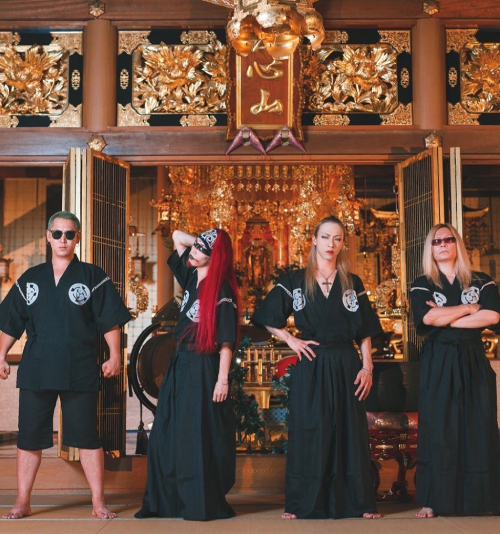 What do you like mostly in visual aspects - typical Japanese art or also Western area (modern) arts?
What do you like mostly in visual aspects - typical Japanese art or also Western area (modern) arts?
„Very difficult question. I like things that are balanced and nicely mixed. But in general, in Japan, people prefer Western things. It is like our music. The foundation is Western Rock and classical music mixed with Japanese elements.“
Sounds partly like freaking out (more) Ensiferum with (lesser) Children Of Bodom on the Power Metal trip with an overdose of amphetamines - „Guren No Yumiya“, featuring Matthew is so exciting fast! How many times a week do you have to practise over the years to learn to play so precisely at such high speed?
„Before the tour that just ended today, I practiced for hours every day for about 3 months for only 5 songs. I practice a lot, especially since I play lead guitar with Sing sametime for years. It's hard sometimes, but basically I like practicing! You shouldn't do it thinking it's painful. But I think it's hard sometimes.“
What do you like to tell the readers about the cooperation at production with Matthew? An 'electrifying gathering' of likeminded Asian souls?
„I think it means a lot that we together changed the name from Gyze to Ryujin. He is very proud of the fact that he is partly Japanese and I am also very proud of his success as a Japanese, so it was a good combination. I have never seen a gentleman like him, not to mention his music. He is truly the Last Samurai of Japan. He is a producer, mentor, brother, and really good friend. On the production side, he focused on my hidden potential of clean vocals and more variety in my compositions. Of course, there was also the usual Japanese stuff with shamisen and stuff. The approach we had was really good.“
Matthew also did contribute as guest musician - please report the most important facts about!
„I'm a big fan of him. I love his singing, guitar, and songwriting. This time he sang, and it was great! I hope you will listen to it and check it out! That's number one!“
More guests: also Mukai Wataru of the Kansai Philharmonic Orchestra on cello is also to hear, what do you like to tell about?
„Mukai-san is a first-rate cellist and has played in the works of my favorite composer, Joe Hisaishi (Studio Ghibli, etc.). He is also a Metal fan. He understands and sympathizes with our music very deeply. Just by listening to his sound, the song itself is taken to the next level. I would like you to listen to it deeply with headphones! He is a world-class artist who lives in the same city of Chitose, Hokkaido, and I respect him very much.“
The German spoken passage in „Guren No Yumiya“ is lovely, who had the idea?
„The original track was also in German and Matt recorded it. The opening Japanese part is my voice.“
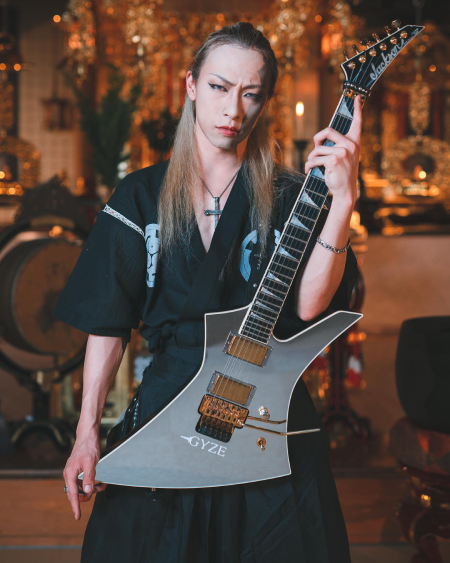 How did arose and ripened the whole style over the years and what bands and artists did influence you the most?
How did arose and ripened the whole style over the years and what bands and artists did influence you the most?
„Not very much, but I can't narrow it down to just one. I'm still always keeping an open mind and taking in new things and learning. Personally, I like film music and classical music. Also old Japanese pop music always gives me hints. I had a lot of musical discussions with Janne from Ensiferum while we were on tour, and he told me that the original Finnish Metal music was pop from the 70's. When I listened to it, I understood it, to my surprise, it was similar to old Japanese pop music. I am sure that I am also unknowingly creating my originality through a fine mixture of influences from many sources. In terms of attitude, I was influenced by Joe Hisaishi, whom I mentioned earlier, and the old composer Akira Ifukube. In other words, they are people who incorporated Japan into Western classical music.“
And you know how to create contrasts, hats off for that! Personally, I miss a little more or more pronounced traditional Folk parts, but your music can stand on its own without them, because you sometimes use noticeably Japanese-traditional melodies, like in the title track, for example. What do you value most in your style?
„I agree with that. You mean you want a Japanese approach like ‚God Samurai Ninja‘, ‚Samurai Metal‘, ‚Ninja Dance‘, which were released as singles only, right? For us the most important thing is the melody and a Japanese approach. The arrangements and instrumentation were chosen with an awareness of the fact that the songs are Japanese in some way but not too much. The single ‚The Rainbow Song‘ is not a traditional Japanese approach, but it's more like anime music. I think it's a great example of Japanese music. It's modern. The title track is, as you say, a traditional melody, but the arrangement is very much influenced by classical music like Holst and Dvorak. I think we've struck a very nice balance of a lot of styles!“
Please bring the readers closer to the main lyrical content of your upcoming album!
„There's a lot of Japanese to begin with, but each song is about a different thing! The first single, ‚Raijin & Fujin‘, was co-written with Matt and is about the Gods of Thunder and Wind. There are so many variations, so please buy the CD or Vinyl and listen to the songs as you read them! I hope you will learn some simple Japanese and singing along with me!“
Are there any things, books, movies, etc. that can or have influenced you as musicians?
„I was influenced a lot by the music of the Studio Ghibli films I mentioned earlier. I was also influenced a lot by Akira Ifukube's Godzilla work. I also like the famous Last Samurai. I remember I felt I could see Japan from the world's point of view, which was very interesting. As for books, Paul of KISS's autobiography greatly helped me in my life as a musician.“
Why the name changes from Suicide Heaven over Gyze to Ryujin, after four full-lengths and several within 11-12 years more releases?
„I am proud of Gyze's activities. I'm proud of what Gyze did, but it seems to be hard to pronounce and we were always called ‚Guys‘. Matthew didn't understand it at first either, so we talked about changing the name and in combination with my first name we came up with he new Band name Ryujin.“
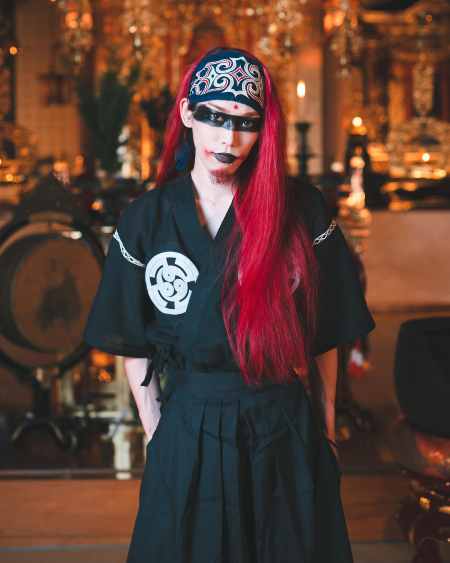 Ryujin stands for the Japanese Dragon God of the sea, the band info says. Do you live near the sea and have you experienced a lot of its forces - or how did you come up with the band's name?
Ryujin stands for the Japanese Dragon God of the sea, the band info says. Do you live near the sea and have you experienced a lot of its forces - or how did you come up with the band's name?
„Well, actually, it is because Japan itself is surrounded by the sea, and I am familiar with all the nature of mountains and rivers. I live rather close to the mountains. I mean, Japan has volcanoes everywhere, and there are beautiful rivers and immediate access to the sea. In the song ‚Ryujin‘, both the ocean and the mountains appear in the lyrics. I am more attracted to mountains, forests, and lakes! To elaborate on my name, my name Ryoji is made up of two Chinese characters: ‚dragon‘ and ‚master‘. (竜司) Ryujin is a Dragon God. (竜神) Besides, many fortune-tellers have told me that I am possessed by the dragon god. The number eight also seems to have something to do with dragons, and my birthday is November 8.“
How deep are you related to Animes and Mangas?
„I like the music of the anime more than the content! I also read a lot of manga, but I don't know if it has anything to do with the music. It's just that manga is always present in my daily life in Japan.“
Four headstrong, determined and individually thinking personalities in one band - after many years together, these well proved line-up will remain constant for the next years, isn't?
„Well, actually it's more like a solo project for me, since 2009. The band members change each time we go on tour, and I am the only guitarist in the band right now. But my brother Shuji, the drummer, and I are family, so we have a deep connection. I have a deep connection with my brother and drummer Shuji, and Aruta, the bass player, is a good friend of mine.“
Who out of you guys did the lion's share of the new song material?
„Almost 100 % me without ‚Raijin & Fujin‘.“
How was the selection of songs for the album done - was it difficult or rather easy for the band?
„I sent all my demos to Matt to decide! What surprised me a little was that he chose a pop song and a ballad. And I thought he would choose more traditional Japanese songs, but he also chose modern songs. I was a little confused and worried about the ballads and pop songs, but I think it opened a big door for me!“
Is there and in case yes, what is the o-n-e song with the most meaning for you on the new album and why?
„I think ‚Raijin & Fujin‘. I know you said it's just one song, but I think ‚Ryujin‘ is a meaningful song as well.“
© Markus Eck, 01.12.2023
[ to overview ]
Multiple five-star rated PR Agency that works professionally and reliably with numerous partners in the worldwide music media.
Many years of extensive and in-depth experience in various musical fields form the basis for an individual and efficient service at Metal Message ᴳᴸᴼᴮᴬᴸ.
Main field of activity besides communication for global Public Relations are integrated Promotion Campaigns in print, online and broadcast, as well as marketing, artist management, consulting and mentoring.
Just like an exquisite manufactory - where passion meets profession!
Merch
•
Releases
•
Concerts
•
Cover Art Mediation
•
Media Area
•
Global Fame
•
Iron Talks • Podcast
ATMósferas Magazine
Bleeding4Metal
Crossfire Metal
Darkzen Dragon
Epic Metal Blog
Filthy Dogs Of Metal
Frenzy Fire
Hanf- und Wander-Metaller
Highwire Daze Online
Legacy
MetalUnderground AT
Metal Addicts
Metal Gods TV
Metal Opera
Metal Pedia
Metal Temple
Metal Titans
Pete's Rock News And Views
Powermetal DE
Stormbringer
The Cosmick View
The Murder Inn
Time For Metal
Via Nocturna
World Of Metal
X-Reviews
Zephyr's Odem
1921 Baliheadbanger
Demontre Radio
Das Metalmagazin hart&direkt
Hijos De La Luna
La Caverna De Hierro
Loud And Proud
Metal Only
Metal Tavern Radio
PowerPlant Radio NL
Radio Diabolus
PODCASTS
LABELS
Disclaimer
Impressum
Datenschutzerklärung
•
FAQ
•
Design & Programming
Help Metal Message ᴳᴸᴼᴮᴬᴸ • 𝐸𝓈𝓉. 2001 with your donation via 𝗣𝗮𝘆𝗣𝗮𝗹 to give its artist clients worldwide the most dedicated & professional support!
© Metal Message ᴳᴸᴼᴮᴬᴸ • 2001-2024 • All rights reserved
Unauthorized use and/or duplication of this material without express and written permission from this site’s author and/or owner is strictly prohibited.
Excerpts and links may be used, provided that full and clear credit is given to Metal Message ᴳᴸᴼᴮᴬᴸ with appropriate and specific direction to the original content.
















